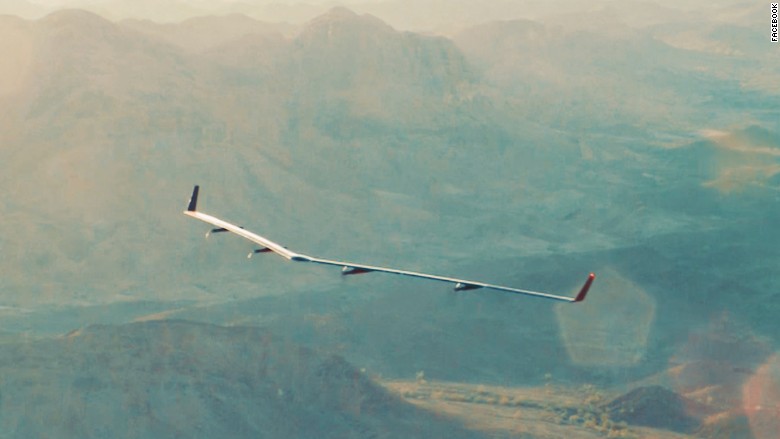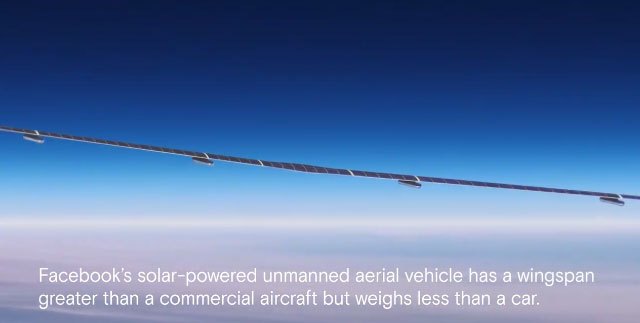Mark Zuckerberg, founder and head of Facebook, met with Pope Francis yesterday. The Pope, a known follower of high-technology innovations, has declared the Internet a “gift from God,” and emphasized the importance of building a connected society that is “healthy and open to sharing.” As Digital Trends.com reports, Zuckerberg is the latest representative from Silicon Valley to be granted a Papal audience. He follows Apple CEO Tim Cook, Alphabet chairman Eric Schmidt, and Instagram CEO Kevin Systrom, but unlike them, brought a gift, a scale model of Facebook’s Aquila solar-powered drone soon to be carrying the Net to remote areas of the world. Digital Trends reports that Zuckerberg took to Facebook (of course) to report on the meeting, explaining there are “parallels between the Pope’s mission of ‘communicating’ with people around the world and his company’s goal of providing internet access to underserved regions.” Zuckerberg told his Facebook followers, “Priscilla and I had the honor of meeting Pope Francis at the Vatican. …
A Quiet Air Force Spreading Commerce and Knowledge
Two years ago, Mark Zuckerberg, the head of Facebook, promised a far-reaching goal for his firm. ”Today, we’re sharing some details of the work Facebook’s Connectivity Lab is doing to build drones, satellites and lasers to deliver the internet to everyone. ”Our goal with Internet.org is to make affordable access to basic internet services available to every person in the world.” We reported on this activity almost a year ago, and provided technical details that are coming to fruition with the first flight of the Aquila drone, a large flying wing that looks a great deal like the Prandtl-D research vehicle designed by Al Bowers and a group of graduate students. A primary difference – Facebook’s machine has winglets or tip rudders to assist in directional control. The Facebook video shows the highlights, but the following video from the BBC gives more detail and insights from Jay Parikh, head of global engineering for Facebook. Note that the launch vehicle has additional motors …
Facebook Unveils a Very Big, Very Light Electric Flying Wing
Facebook founder Mark Zuckerberg is intent on providing at least basic Internet services to everyone in the world, even if means creating his own air force to accomplish that lofty goal. March 27, 2014, he shared his overall plan, including a large fleet of airplanes that would loiter in the stratosphere, beaming high-speed Internet connections to one and all. Just a few days ago, Zuckerberg announced the completion of the first full-scale aircraft for this grand plan, the Aquila. Aquila has the wingspan of a Boeing 737, but weighs in at around 400 kilograms (880 pounds). Apparently built in England by his recently acquired team of aeronautical experts, Aquila will be able to stay in the air for months at a time, its solar-cell-clad wing powering its four motors – looking very interesting on the noses of their probable battery pods. Like the Solar Impulse and Eric Raymond’s Sunseekers and Duo, solar energy collected beyond that needed to propel the airplane …
Belite – Going Electric?
Even to the casual observer, interest in electric flight is growing. Major news outlets followed Solar Impulse, especially as it began its journey from Japan to Hawaii. The fluster of cross-English-Channel attempts combined daring and rivalries – great for a public appetite voracious for sensation. With big companies investing significant sums in the new technology, and with demonstrated efficiency of small craft that won 2011’s Green Flight Challenge, designers can’t help but respond to the ongoing challenge. James Wiebe, founder and owner of Belite Aircraft, has a response that will be welcomed by aviators who might not be able to fly because of their budget. He’s introduced the SkyDock low-wing ultralight at Oshkosh’s AirVenture 2015 this week at an introductory price of $3,995 for the basic kit. Basic means no wheels, tires, cables, brakes, fabric, paint, glue or instruments. Wiebe explains on his Facebook page, “We plan to have an option package for most of that stuff. It’s all off …


